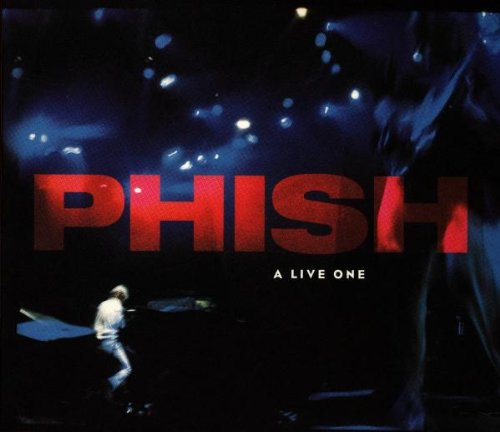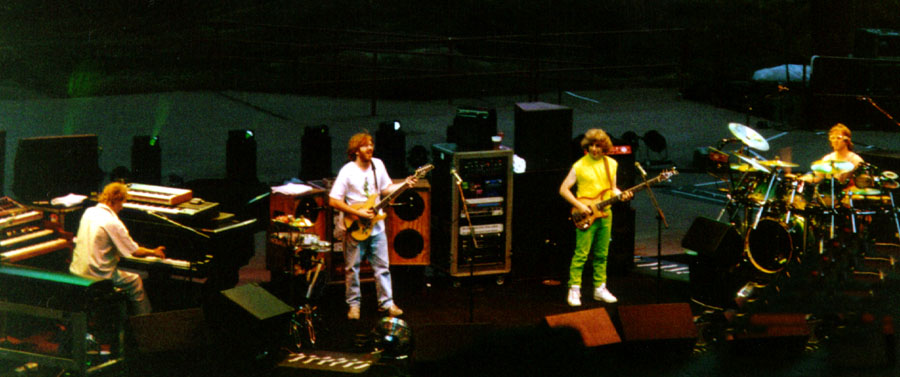Saturday, June 27, 2015
a live one
Phish tweezed out some groovy gumbo with the bouncing brouhaha of this dionysian dogmatagram. After forming in Burlington, Vermont in 1983, the group had developed a following with their improvisational performances, drawing comparisons to The Grateful Dead as well as Frank Zappa. After four increasingly successful albums (Junta, Lawn Boy, A Picture of Nectar, Rift, and Hoist), the quartet finally decided to release their first live album. 'A Live One' was produced by Phish, taking each of its twelve songs from a different show in 1994. The album features Trey Anastasio on guitars and vocals; Page McConnell on keyboards and vocals; Mike Gordon on bass guitar and vocals; and Jon Fishman on drums and vocals. "Gumbo" was performed with The Giant Country Horns: Peter Apfelbaum on tenor saxophone, Carl Gerhard on trumpet, Dave Grippo on alto saxophone, James Harvey on trombone, and Michael Ray on trumpet.
Anastasio: "There is absolutely a connection [with the Grateful Dead]. We do share fans. I think its an energy thing and a sense of adventure. There's a similarity with the Dead shows because of the risk in improvisation. They do it. We do it. And you never know what's going to happen... I've seen the Dead once in the past seven years, but I saw them a lot when I was in high school. Personally, I've always listened to a lot of different kinds of music. I was just watching an old Zappa video on the bus last night. I always loved Zappa's compositional sense and his bands. We draw on bluegrass and the harmonies of traditional American music. And there's jazz. I just did a short, three-night tour with Michael Ray, who was a trumpet player with Sun Ra and did horn arrangements for Kool and the Gang. He also came out and jammed with us on a couple of occasions. As far as the Dead, I like the sort of spirituality and transcendance thing they get into when they write and improvise...[The erratic nature of improvisation is] not as much of an on-off thing [for us] as it is with the Dead. But it ensures that each night is different. We try to let the spontaneity take over. We just played Dallas the other night, and the last 65 minutes of the show were completely improvised. It wasn't planned, but it happened, and we just took off. If it wasn't for nights like that, I wouldn't be doing this. I'm not traveling eight months out of the year just to sit in hotel rooms."
McConnell: "The Grateful Dead is a very important band for us and for a lot of other bands. It's not that we deny their influence. But if there's a constant comparison all the time, I think that you're probably feeling... He was probably feeling frustration but you know, we've really all been to a lot of Dead shows and have all been influenced by the Dead, but lots of other bands also...We practice a good bit. Not so much for this tour, because we've been in the studio working on the new album since February. But usually before we go on tour, we spend anywhere from 2 weeks to 2 months alone in bar in Vermont, practicing, and then we do different listening exercises...Suppose the 4 of us are the band and I start to play a phrase, then you hear what I'm playing and you start to play a phrase that goes along with. And everybody box in together and there's this litlle pattern whatever it is. And then we all aknowledge that we're all listening to each other, and we've all achieved the pattern, we say "Hey!". And that signifies the next person starts. And now you. It's your pattern. We're all focusing on you and then we say "Hey!" again, it just keeps going around and we call that the 'Hey!' exercise. It's one of the things we do. I mean that's avery simple exercise, but we practice listening to each other, trying different kinds of music, different kinds of groups, trying to offer suggestions to each other...The jazz? we all... the thing is maybe I sort of brought the jazz element to the band but we all listen to jazz. Now maybe Mike brought the bluegrass element to the band but we all listen to bluegrass. So, you know, we all played in bands in high school. We all had our own high school bands, we all had this idea pal, it was gonna be, you know, we've got a band. So we've got similar background, we appreciate each other."
Gordon: "It borrows on some of the same philosophies as well as philosophies from other groups. You know, there’s the Frank Zappa influence and groups not found in pop music, but in other styles. But it takes a certain philosophy of jamming, in allowing the music to be, allowing the group mind to develop and the music to take on its own thing where the individuals aren’t controlling it, which the Dead definitely believe in. It adds a consciousness where some of the jamming is on more of a conscious level, and we’re making decisions, as a band, to suddenly switch the jam in a different direction. We actually practice jamming exercises, and I think it’s the sort of thing that the Dead have never believed in – to practice jamming. But, with us, we’ve found that it’s listening exercises because, if a gig is good, it’s always that we’re hooked up as a unit and we’re listening to each other and are very aware. If it’s ever a bad gig, it tends to be when different band members are in their own worlds and aren’t aware of each other. So we do exercises in our practice room at home to make sure that we can hook up and that each person can hear each band member and react to each other. As a result, if we’re jamming, it’s possible that we’ll suddenly change the tempo to three times the speed, switch keys, and go off on a different… someone once described it as a herd of buffaloes that were going fast through a field and suddenly took a left turn together. But there are other people who actually described it, this sort of new direction in improvised music that we’re taking, as being sort of the coming together of a Dionysian and Apollonian values where the ecstasy of the Dionysian ritual is combined with the consciousness and thoughtfulness of the Apollonian ethic and combined into a new art form. In terms of modern music, some people have said that’s what’s happening with us...My theory is that ideally, if music is a meditation, and if everyone is accepting the moment and has faith in the moment and in the music as carrying us without letting the ego get involved too much, that there will be those moments when I’ll be standing there and another note will appear in the bass line, if it’s a pattern, and it will have come from somewhere else. Music will sort of metamorphosize, and the other people will hear it."
Fishman: "[There's] one hundred and fifty [songs in our repertoire]. We pick some up to build a set list in which there’s some singing, good different grooves and feels. Then we actually perform 30 or 40 percent of this set list, because we change it according to the feeling onstage ... I saw [the connection with the fans] at my first Grateful Dead concert in the ‘80s. It is really a group thing. There is a higher purpose to the whole thing. Music suggests higher ways of living. I like the feeling we have on tour with people following us. I wish we would play more gigs. We used to play 180 gigs a year, now we only play about 90."
'A Live One' went to number eighteen on the US album chart and was certified platinum.
http://phish.com/
http://phish.net/
'A Live One'
full album:
https://www.youtube.com/playlist?list=PLRSSNC4bH3MqdtDmS3Jhgot41QwcYK2tN
All songs written and composed by Trey Anastasio, Tom Marshall, except where noted.
disc one
"Bouncing Around the Room" – 4:08
"Stash" – 12:31
"Gumbo" (Anastasio, Jon Fishman) – 5:14
"Montana" (Anastasio, Fishman, Gordon, McConnell) – 2:04
"You Enjoy Myself" (Anastasio) – 20:57
"Chalk Dust Torture" – 6:48
"Slave to the Traffic Light" (Dave Abrahams, Anastasio, Steve Pollak) – 10:46
disc two
"Wilson" (Anastasio, Marshall, Aaron Woolf) – 5:07
"Tweezer" (Anastasio, Fishman, Gordon, McConnell) – 30:55
"Simple" (Gordon) – 4:53
"Harry Hood" (Anastasio, Fishman, Gordon, Brian Long, McConnell) – 15:11
"The Squirming Coil" – 12:30
recording dates
"Stash," July 8, 1994, Great Woods Center for the Performing Arts, Mansfield, MA
"The Squirming Coil," October 9, 1994, A. J. Palumbo Center, Pittsburgh, PA
"Harry Hood" October 23, 1994, Band Shell, University of Florida, Gainesville, FL
"Tweezer," November 2, 1994, Bangor Auditorium, Bangor, ME
"Chalk Dust Torture," November 16, 1994, Hill Auditorium, University of Michigan, Ann Arbor, MI
"Slave to the Traffic Light," November 26, 1994, Orpheum Theatre, Minneapolis, MN
"Montana," November 28, 1994, Field House, Montana State University, Bozeman, MT
"Gumbo," December 2, 1994, Recreation Hall, University of California, Davis, Davis, CA
"You Enjoy Myself," December 7, 1994, Spreckels Theater Building, San Diego, CA
"Simple," December 10, 1994, Santa Monica Civic Auditorium, Santa Monica, CA
"Wilson," December 30, 1994, Madison Square Garden, New York, NY
"Bouncing Around the Room," December 31, 1994, Boston Garden, Boston, MA
Subscribe to:
Post Comments (Atom)



No comments:
Post a Comment